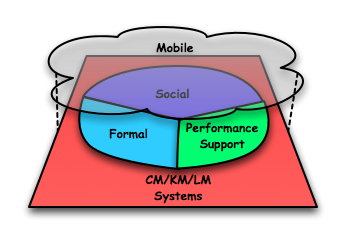In trying to get attention for work, a colleague is concerned with the ‘learning’ label being a potential detriment. It’s probably true, and that’s a sad state of affairs. While I joke that we who work in the learning/training/performance/etc field are those who’ve retained their love of learning despite schooling, I do believe that there’s some baggage associated with the term.
If you put on a ‘serious business’ perspective, learning can seem like warm and fuzzy coddling. “What we really need is to hire the talent we need and let them know what to do and have them do it, right? They’ll do it, and like it, or they’re out!” Which, of course, is ridiculous, but who doesn’t believe that view is out there?
What’s really the case is that each organization will have it’s own way of doing things, and that individuals will need to be brought up to speed, then provided resources to support performing, and expected to contribute. And, as I am coming to believe, as things get more complex, we’ll need more from people in terms of adaptation.
Or, as Kevin Wheeler put it:
Today success is in the hands of creative people who have energy and excitement over reaching a business objective. These people are hard to find and hard to keep as their energy and entrepreneurial spirit are not always suited to a controlled environment. They need space, time, and freedom to experiment. They thrive in a networked world where they can exchange ideas, swap experiments, and engage in conversation.
That, to me, is learning. To look at it another way, I lump innovation, problem-solving, creativity, design, and more all as activities of learning. Herb Simon said “to design is human”, and I believe that design is about learning. But maybe it’s about thinking? Doing?
So, to me, it’s a shame that a ‘learning’ label would be a barrier to being perceived as relevant to business, but that seems to be the case. My question is, do we rebrand, or do we reengineer learning’s status in the organization. I don’t have an answer, do you?
 So I’ve been playing with rethinking my Performance Ecosystem conceptualization and visualization. The original had very discrete components, and an almost linear path, and that doesn’t quite convey the reality of how things are tied together. I believe it’s useful to help people see the components, but it doesn’t capture the goal of an integrated system.
So I’ve been playing with rethinking my Performance Ecosystem conceptualization and visualization. The original had very discrete components, and an almost linear path, and that doesn’t quite convey the reality of how things are tied together. I believe it’s useful to help people see the components, but it doesn’t capture the goal of an integrated system. So here’s my current conception. It took me a long time to create the circle with different components! First I had to discover that there were tools to create freeform shapes, and then work to get them to articulate, but I like the kind of ‘rough’ feel of it (appropriate for it’s stage).
So here’s my current conception. It took me a long time to create the circle with different components! First I had to discover that there were tools to create freeform shapes, and then work to get them to articulate, but I like the kind of ‘rough’ feel of it (appropriate for it’s stage).